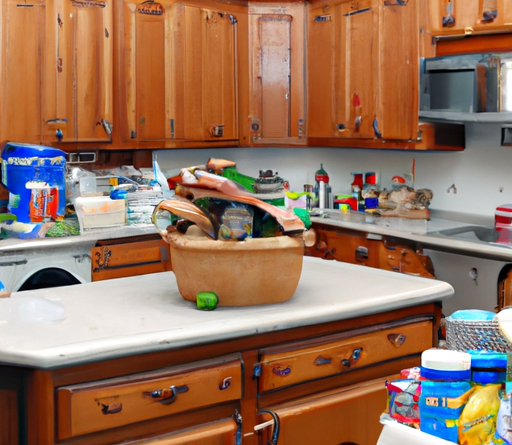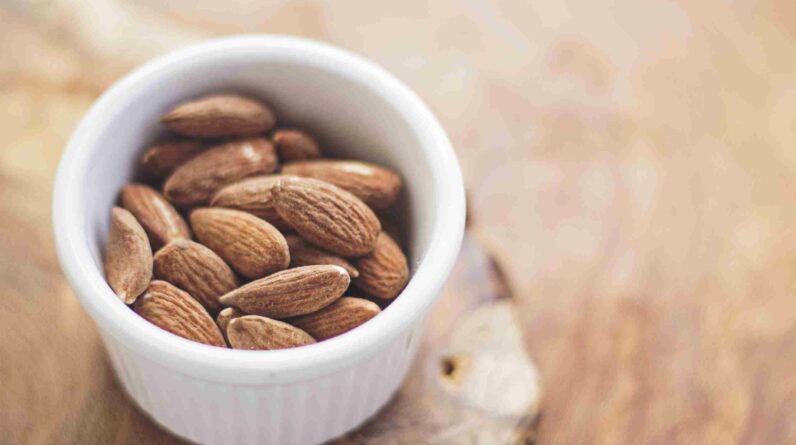Having a fresh-smelling and efficiently running kitchen garbage disposal is a common goal for many of us. We all want to avoid those unpleasant odors and clogged pipes that can disrupt our daily routines. In this article, we will explore some simple yet effective tips and tricks to help you achieve a clean and well-functioning disposal system. So, say goodbye to those dreadful smells and hello to a more pleasant kitchen experience!
Preventing Odors
Regular Cleaning
Regular cleaning is essential to prevent odors from building up in your kitchen garbage disposal. We recommend cleaning it at least once a week to keep it fresh and functioning properly. To clean your garbage disposal, simply turn it off and unplug it from the power source. Use a brush or a toothbrush to scrub the rubber flaps and the inside of the disposal. Be sure to remove any food particles or debris that may have accumulated. Rinse it thoroughly with water and plug it back in. Regular cleaning will help eliminate any lingering odors and keep your garbage disposal in tip-top shape.
Citrus Cleaning
One of the easiest and most effective ways to keep your garbage disposal smelling fresh is by using citrus fruits. Citrus fruits, such as lemons or oranges, have natural deodorizing properties that can help eliminate unpleasant odors. Simply cut a citrus fruit into small pieces and place them in the disposal. Turn on the disposal and run cold water for a few seconds. The citric acid and fresh scent of the fruit will help neutralize any foul smells. It’s a simple and natural solution that will leave your garbage disposal smelling fresh and clean.
Baking Soda and Vinegar
Another effective method to prevent odors in your kitchen garbage disposal is by using a combination of baking soda and vinegar. Start by pouring one cup of baking soda into the disposal. Let it sit for a few minutes to absorb any unpleasant odors. Next, pour one cup of vinegar into the disposal and let it fizz for a few minutes. The chemical reaction between the baking soda and vinegar will help break down any food particles or buildup in the disposal. Finally, run cold water for a few seconds to wash away any remaining residue. This simple and affordable solution will leave your garbage disposal odor-free and running efficiently.
Freeze and Grind Lemon or Orange Peels
If you want to take your citrus cleaning to the next level, try freezing lemon or orange peels and grinding them in your garbage disposal. Start by cutting the peels into small pieces and place them in a ziplock bag. Seal the bag and freeze it overnight. The frozen peels will help remove any grease or grime from the disposal blades. The next day, turn on the disposal and run cold water while adding the frozen peels. The ice-cold citrus peels will freshen up the garbage disposal and leave a pleasant aroma in your kitchen. It’s an easy and refreshing way to keep your disposal smelling fresh and clean.
Use Ice Cubes
Ice cubes can be a surprising ally in preventing odors in your garbage disposal. The cold temperature of the ice cubes helps solidify any fats or oils that may have accumulated in the disposal. Start by filling an ice cube tray with vinegar or lemon juice. Once frozen, run cold water and turn on the disposal. Drop a few ice cubes into the disposal and let it grind them up. The ice cubes will help clean the disposal blades and remove any debris. Finish by running water for a few seconds to wash away any remaining residue. This simple trick will keep your garbage disposal smelling fresh and running smoothly.
Avoiding Clogs
Avoid Hard and Fibrous Foods
To prevent clogs in your garbage disposal, it’s important to avoid feeding it hard or fibrous foods. Examples of hard foods include bones, shells, and fruit pits, which can damage the blades and cause clogs. Fibrous foods, such as celery, onion skins, and corn husks, can get tangled in the disposal and jam the motor. It’s best to dispose of these items in the regular trash or compost them instead of putting them down the garbage disposal. By avoiding these foods, you’ll minimize the risk of clogs and keep your disposal running smoothly.
Cut Food Waste into Smaller Pieces
Another tip to avoid clogs in your garbage disposal is to cut food waste into smaller pieces before putting it down the disposal. By breaking down food waste into smaller chunks, you reduce the likelihood of blockages and ensure that the disposal can effectively grind and dispose of the waste. Take a few extra seconds to cut up larger pieces of food waste, such as vegetables or meat, into smaller, more manageable sizes. This simple step can prevent clogs and keep your garbage disposal in optimal condition.
Flush with Cold Water
Flushing your garbage disposal with cold water is an effective way to prevent clogs. Cold water helps solidify oils and fats, making them easier for the disposal to grind and flush away. Whenever you use the disposal, run cold water before, during, and after the process. This will help keep the disposal clean and prevent any food particles from sticking to the blades or accumulating in the pipes. Additionally, using cold water instead of hot water conserves energy, making it an environmentally-friendly choice. By flushing your garbage disposal with cold water, you’ll minimize the risk of clogs and keep it running smoothly.
Refrain from Pouring Grease or Oil
Pouring grease or oil down the garbage disposal is a surefire way to clog it. When hot grease or oil cools down, it solidifies and can block the disposal blades and pipes. Instead of pouring grease or oil down the drain, it’s best to collect it in a heat-resistant container and dispose of it in the regular trash. This not only prevents clogs but also protects your plumbing system from potential damage. By refraining from pouring grease or oil down the garbage disposal, you’ll maintain its efficiency and prevent costly repairs.
Avoid Putting Non-Food Items
To avoid clogs and potential damage to your garbage disposal, it’s important to only put food waste down the drain. Non-food items, such as plastic, metal, glass, or paper, can jam the disposal, damage the blades, or even cause the motor to burn out. Before running the disposal, always double-check that only food waste is present in the sink. If you accidentally drop a non-food item down the disposal, turn it off immediately and consult the manufacturer’s instructions for safe removal. By avoiding non-food items, you’ll keep your garbage disposal functioning properly and prevent unnecessary repairs.

Freshening with Natural Ingredients
Use Lemon or Lime
Lemons and limes are not only great for adding flavor to your recipes but also for freshening up your garbage disposal. The natural acids found in these citrus fruits help eliminate odors and leave a refreshing scent in your kitchen. Cut a lemon or lime into small pieces and run them through your garbage disposal. The citrus juices and peels will freshen up the disposal blades and remove any unpleasant smells. For an extra boost, you can freeze the lemon or lime peels and grind them in the disposal. This simple and natural method will leave your garbage disposal smelling clean and citrusy.
Utilize Coffee Grounds
If you love the smell of freshly brewed coffee, you’ll be pleased to know that coffee grounds can also be used to freshen your garbage disposal. After brewing your morning cup of joe, instead of throwing away the coffee grounds, consider repurposing them. Simply run the coffee grounds through your garbage disposal and let it grind them up. The coffee grounds will help neutralize odors and leave a pleasant coffee aroma in your kitchen. It’s a cost-effective and eco-friendly way to keep your garbage disposal smelling fresh and inviting.
Try Peppermint or Tea Tree Oil
Peppermint and tea tree oil are both known for their natural antimicrobial properties and refreshing scents. A few drops of either oil can go a long way in freshening up your garbage disposal. Combine a few drops of your chosen oil with water in a spray bottle and mist it into the disposal. Alternatively, you can soak a cotton ball in the oil and place it in the disposal overnight. The next day, run cold water and turn on the disposal to flush away any remaining residue. The peppermint or tea tree aroma will leave your garbage disposal smelling clean and invigorating.
Employ Vinegar
Vinegar is a versatile household ingredient that can be used for a variety of cleaning purposes, including freshening up your garbage disposal. Its acidic properties help break down food particles and neutralize odors. To freshen your disposal with vinegar, pour one cup of vinegar into the disposal and let it sit for a few minutes. Then, run cold water and turn on the disposal to flush away the vinegar and any residue. The vinegar will eliminate any lingering odors and leave your garbage disposal smelling clean and fresh. It’s a natural and affordable solution for maintaining a pleasant kitchen environment.
Experiment with Essential Oils
If you’re looking for a customized scent for your garbage disposal, essential oils are a great option. Essential oils come in a wide array of fragrances, allowing you to choose the one that suits your preferences. Start by combining a few drops of your chosen essential oil with water in a spray bottle. Mist the mixture into the garbage disposal and let it sit for a few minutes. Then, run cold water and turn on the disposal to flush away any residue. The essential oil will infuse your disposal with a delightful scent. Feel free to experiment with different oils to find your favorite aroma.
Maintaining Effective Grinding
Feed Small Amounts at a Time
To maintain effective grinding in your garbage disposal, it’s important to feed it small amounts of food waste at a time. Overloading the disposal with large quantities of food waste can strain the motor and cause clogs. Instead, gradually feed the disposal with small portions of food waste, allowing it to grind and dispose of the waste efficiently. This will ensure that the disposal can effectively break down the food particles and prevent any blockages or jams. By feeding small amounts at a time, you’ll keep your garbage disposal running smoothly.
Run Cold Water While Grinding
Running cold water while grinding your garbage disposal is crucial for maintaining its performance. Cold water helps keep the disposal and its blades at a lower temperature, preventing overheating. It also helps solidify any fats or oils, making them easier to grind and flush away. Before, during, and after using the disposal, make sure to run cold water for a few seconds. This will not only keep the disposal clean but also ensure its efficient functioning. By running cold water while grinding, you’ll prolong the lifespan of your garbage disposal and prevent any potential issues.
Periodically Sharpen the Blades
Just like any other cutting implement, the blades of your garbage disposal can become dull over time. Dull blades can lead to inefficient grinding and potential clogs. To maintain effective grinding, it’s important to periodically sharpen the blades. One way to sharpen the blades is by grinding ice cubes in the disposal. The ice cubes act as an abrasive, helping to sharpen the blades and remove any buildup or debris. Another method is to use a commercial garbage disposal cleaner that is specifically designed to sharpen the blades. Follow the manufacturer’s instructions for proper usage. By periodically sharpening the blades, you’ll ensure consistent performance and prevent any grinding issues.
Avoid Overloading the Disposal
Overloading your garbage disposal can put unnecessary strain on the motor and blades, potentially leading to clogs or even motor burnout. To prevent these problems, it’s important to avoid overloading the disposal with large quantities of food waste. Instead, feed it small amounts at a time, allowing it to grind and dispose of the waste efficiently. If you have a large amount of food waste, consider disposing of it in smaller batches. By avoiding overloading the disposal, you’ll protect its motor and blades, ensuring smooth and effective grinding.
Use Grinding Agents (Eggshells, Ice)
Using grinding agents, such as eggshells or ice cubes, can help keep your garbage disposal blades sharp and clean. Eggshells are a natural abrasive that can help remove any buildup or debris from the disposal blades. Simply grind a few eggshells in the disposal to sharpen the blades and keep them in optimal condition. Ice cubes, on the other hand, act as a natural cleaner, helping to remove any lingering food particles from the blades and the inside of the disposal. Simply drop a few ice cubes down the disposal and let it grind them up. The grinding action of the ice cubes will help clean the blades and keep the disposal running smoothly. By using grinding agents, you’ll maintain effective grinding and prolong the lifespan of your garbage disposal.

Dealing with Persistent Odors
Use Dish Soap and Cold Water
If you’re dealing with persistent odors in your garbage disposal, using dish soap and cold water can be a simple and effective solution. Start by squeezing a few drops of dish soap directly into the disposal. Then, run cold water and turn on the disposal to create a soapy mixture. Let the soapy water circulate in the disposal for a few seconds to break down any odor-causing substances. Finally, rinse the disposal with cold water for a few seconds to wash away any remaining residue. The dish soap will help eliminate odors and leave your garbage disposal smelling fresh and clean.
Try a Baking Soda and Vinegar Mixture
If dish soap alone doesn’t do the trick, you can try a mixture of baking soda and vinegar to combat persistent odors in your garbage disposal. Start by pouring half a cup of baking soda into the disposal. Let it sit for a few minutes to absorb any odors. Then, pour one cup of vinegar into the disposal, causing it to fizz. The chemical reaction between the baking soda and vinegar will help neutralize the odors. Let the mixture sit for a few more minutes, then run cold water and turn on the disposal to flush away the mixture. The baking soda and vinegar mixture will effectively remove persistent odors and leave your garbage disposal smelling fresh and clean.
Use a Specialized Garbage Disposal Cleaner
If you’ve tried various home remedies and still can’t get rid of persistent odors in your garbage disposal, it may be time to consider using a specialized garbage disposal cleaner. There are various commercial cleaners available on the market that are specifically formulated to eliminate odors and clean your garbage disposal. Follow the manufacturer’s instructions for proper usage. These cleaners often contain enzymes that break down food particles and bacteria, leaving your garbage disposal fresh and odor-free. Using a specialized garbage disposal cleaner can be a convenient and effective solution for stubborn odors.
Flush with Boiling Water
Sometimes, a simple flush with boiling water can help eliminate persistent odors in your garbage disposal. Start by boiling a pot of water. Once the water has reached a rolling boil, carefully pour it down the disposal while it is running. The hot water will help sanitize the disposal and flush away any odor-causing substances. Be cautious when handling boiling water to avoid burns. By flushing your garbage disposal with boiling water, you’ll effectively remove stubborn odors and leave it smelling fresh and clean.
Call a Professional for Inspection
If you’ve tried all the previous methods and still can’t get rid of persistent odors in your garbage disposal, it may be time to call a professional for inspection. A licensed plumber or a garbage disposal specialist can thoroughly inspect your disposal for any underlying issues, such as clogs or mechanical problems. They have the expertise and tools to diagnose and fix any problems that may be causing the persistent odors. Hiring a professional for inspection will ensure that your garbage disposal is in optimal condition and functioning properly.
Preventing Damages
Avoid Deteriorating Rubber Seals
To prevent damages to your garbage disposal, it’s important to avoid deteriorating rubber seals. Over time, the rubber seals can become worn or cracked, leading to leaks or inefficiencies in the disposal. To prevent these damages, avoid using harsh chemicals or abrasive cleaners that can degrade the rubber seals. Instead, opt for mild cleaning solutions, such as dish soap and water, to clean the disposal. Additionally, be cautious when grinding hard objects, as they can damage the rubber seals. By taking care of the rubber seals, you’ll maintain the integrity of your garbage disposal and prevent costly repairs.
Avoid Overheating the Motor
Overheating the motor of your garbage disposal can lead to serious damages and even motor burnout. To prevent overheating, avoid running the disposal for extended periods without breaks. If the disposal feels hot to the touch, turn it off and let it cool down before using it again. Additionally, avoid pouring boiling water down the disposal, as the extreme temperature can also cause overheating. By being mindful of the motor’s temperature and avoiding excessive use, you’ll prolong the lifespan of your garbage disposal and prevent any potential damages.
Refrain from Using Chemical Drain Cleaners
Chemical drain cleaners may seem like an easy solution for unclogging your garbage disposal, but they can actually cause more harm than good. These harsh chemicals can corrode the disposal’s components and cause leaks or other damages. Instead of relying on chemical drain cleaners, opt for natural cleaning methods, such as baking soda and vinegar or specialized garbage disposal cleaners. These alternatives are safer for your disposal and the environment. By refraining from using chemical drain cleaners, you’ll prevent damages and ensure the longevity of your garbage disposal.
Avoid Grinding Hard Objects (Bones, Shells)
Grinding hard objects, such as bones or shells, in your garbage disposal can cause serious damages to the blades, motor, and other components. The disposal is not designed to handle these hard materials, and they can easily break or jam the blades. To prevent damages, it’s best to dispose of bones, shells, and other hard objects in the regular trash or compost them. If you accidentally drop a hard object down the disposal, turn it off immediately and consult the manufacturer’s instructions for safe removal. By avoiding grinding hard objects, you’ll protect your garbage disposal from potential damages and keep it running smoothly.
Ensure Proper Electrical Connections
To prevent damages and ensure the safe operation of your garbage disposal, it’s crucial to have proper electrical connections. Make sure that the disposal is properly wired and grounded to avoid electrical hazards. If you notice any frayed wires or loose connections, it’s important to have them repaired or replaced by a licensed electrician. Additionally, always use the appropriate power source for your disposal, following the manufacturer’s instructions. By ensuring proper electrical connections, you’ll minimize the risk of damages and ensure the safe functioning of your garbage disposal.

Troubleshooting Common Problems
Disposal Not Turning On
If your garbage disposal is not turning on, there are a few troubleshooting steps you can take. First, check if the disposal is properly plugged into the power source. If it is, press the reset button located on the bottom or side of the disposal. If the reset button pops out, it indicates that the disposal tripped a circuit breaker or encountered a power surge. Press the reset button firmly to restore power to the disposal. If the disposal still doesn’t turn on, check the circuit breaker or fuse box to ensure that power is being supplied to the disposal. If none of these steps resolve the issue, it’s best to call a licensed electrician or a professional plumber for further assistance.
Disposal Jammed
A jammed garbage disposal can be a frustrating problem, but there are a few steps you can take to troubleshoot and resolve the issue. Start by turning off the disposal and unplugging it from the power source. Use a flashlight to inspect the disposal for any visible obstructions, such as large food particles or foreign objects. If you can see the obstruction, use long-handled tongs or pliers to carefully remove it. Never use your hands to remove the obstruction to avoid injury. Once the obstruction is removed, plug in the disposal and press the reset button if needed. Turn on the disposal and run cold water to ensure it’s functioning properly. If the jam persists or you’re unable to locate and remove the obstruction, it’s best to contact a professional plumber for assistance.
Slow Draining
If your garbage disposal is draining slowly, it’s likely due to a partial clog in the drainpipe or the disposal itself. Start by turning off the disposal and unplugging it from the power source. Next, place a bucket or a large bowl under the sink to catch any water or debris. Use a pipe wrench or pliers to disconnect the drainpipe from the disposal. Inspect the drainpipe and the disposal for any obstructions, such as food particles or buildup. If you see any blockages, remove them using long-handled tongs or a pipe snake. Once the drainpipe and disposal are clear, reconnect the drainpipe and tighten the connections. Plug in the disposal and run cold water to test for proper drainage. If the problem persists, it may require additional troubleshooting or professional assistance.
Leakage
If you notice water or liquid leaking from your garbage disposal, it’s important to address the issue promptly to prevent further damage to your kitchen cabinets or flooring. Start by turning off the disposal and unplugging it from the power source. Check the connections between the disposal and the drainpipe to ensure they are securely tightened. If you notice any loose connections or damaged gaskets, they may need to be repaired or replaced. Additionally, inspect the disposal for any cracks or visible damage that may be causing the leakage. If you’re unable to identify the source of the leak or if the problem persists, it’s best to contact a professional plumber for further assessment and repair.
Loud or Strange Noises
If your garbage disposal is making loud or strange noises, it may indicate a mechanical issue that needs to be addressed. Start by turning off the disposal and unplugging it from the power source. Inspect the disposal for any visible obstructions, such as large food particles or foreign objects. If you can see the obstruction, use long-handled tongs or pliers to carefully remove it. Once the obstruction is removed, plug in the disposal and press the reset button if needed. Turn on the disposal and run cold water to see if the noise persists. If the noise continues, it may be a sign of worn or damaged blades, loose components, or other mechanical issues. It’s best to contact a professional plumber or a garbage disposal specialist for further assessment and repair.
Regular Maintenance
Check for Loose Parts
Regularly checking for loose parts in your garbage disposal is an important part of its maintenance. Start by turning off the disposal and unplugging it from the power source. Use a flashlight to inspect the disposal for any loose screws, nuts, or other components. If you notice any loose parts, use a wrench or pliers to tighten them securely. Be cautious when working with the disposal and ensure that it is unplugged to avoid any accidental injuries. Regularly checking for loose parts will help prevent any potential issues and keep your garbage disposal functioning properly.
Tighten Connections
Another important step in regular maintenance is to tighten the connections of your garbage disposal. Over time, vibrations and use can cause the connections to loosen, potentially leading to leaks or inefficiencies. Start by turning off the disposal and unplugging it from the power source. Using a wrench or pliers, check the connections between the disposal and the drainpipe, as well as any other connections, such as the electrical wiring. Tighten any loose connections securely. Regularly checking and tightening the connections will ensure that your garbage disposal operates efficiently and prevent any problems.
Inspect for Rust or Corrosion
Regularly inspecting your garbage disposal for rust or corrosion is essential in maintaining its longevity and functionality. Start by turning off the disposal and unplugging it from the power source. Inspect the exterior and interior of the disposal for any signs of rust, corrosion, or deterioration. Pay attention to the blades, grinding chamber, and other metal components. If you notice any rust or corrosion, it’s important to address it promptly to prevent further damage. Use a brush or toothbrush to gently remove any surface rust or grime. For more severe rust or corrosion, consult the manufacturer’s instructions or contact a professional plumber for guidance.
Clean the Splash Guard
Cleaning the splash guard is a simple yet effective maintenance task for your garbage disposal. The splash guard is the rubber flap located at the top of the disposal that helps prevent debris and food particles from splashing back up into the sink. Start by turning off the disposal and unplugging it from the power source. Lift the splash guard and inspect it for any visible debris or buildup. Clean the splash guard by scrubbing it with a brush or a toothbrush under warm water. Be sure to remove any food particles or residue that may have accumulated. Rinse it thoroughly and let it dry before placing it back into position. Regularly cleaning the splash guard will help maintain the hygiene of your garbage disposal and prevent any clogs or odors.
Monitor for Wear on the Blades
Monitoring the condition of the blades in your garbage disposal is important for maintaining effective grinding. Over time, the blades can become dull or worn, leading to inefficient performance and potential clogs. Start by turning off the disposal and unplugging it from the power source. Use a flashlight to inspect the blades for any signs of wear or damage. If you notice any chips, cracks, or dullness, it may be time to sharpen or replace the blades. Consult the manufacturer’s instructions or contact a professional plumber for guidance on blade maintenance. By monitoring the condition of the blades, you’ll ensure that your garbage disposal operates at its best and prevent any potential issues.
Professional Assistance Options
Contact a Licensed Plumber
If you’re experiencing persistent issues with your garbage disposal or are unsure how to troubleshoot and repair it yourself, contacting a licensed plumber is a reliable option. A licensed plumber has the expertise and tools to diagnose and resolve any problems that may arise with your garbage disposal. They can safely handle any repairs, replacements, or installations that are needed, ensuring that your garbage disposal is functioning properly. Contacting a licensed plumber will give you peace of mind knowing that your garbage disposal is in the hands of a qualified professional.
Schedule Routine Maintenance
Scheduling routine maintenance for your garbage disposal is an excellent way to prevent potential problems and ensure its longevity. A professional plumber can perform regular inspections, cleanings, and maintenance tasks to keep your garbage disposal running smoothly. They can identify any small issues before they escalate into major problems and provide the necessary repairs or replacements. By scheduling routine maintenance, you’ll save time and money in the long run and prolong the lifespan of your garbage disposal.
Consider a Repair Service Agreement
If you prefer peace of mind and want to ensure prompt and efficient repairs for your garbage disposal, consider a repair service agreement. Many plumbing companies offer service agreements that provide priority service, discounted rates on repairs, and regular maintenance visits. With a repair service agreement, you can rest assured that any issues with your garbage disposal will be promptly addressed by a professional plumber. It’s an investment in the reliability and longevity of your garbage disposal.
Explore Warranty Coverage
If your garbage disposal is still under warranty, it’s important to explore the coverage and options available to you. Read through the warranty documentation or contact the manufacturer to understand the terms and conditions. If you’re experiencing any issues with your garbage disposal that are covered under the warranty, be sure to follow the manufacturer’s instructions for repairs or replacements. By exploring warranty coverage, you may be able to receive free or discounted repairs, saving you money in the process.
Upgrade to a Newer Model
If your garbage disposal is beyond repair or if you’re looking for a more efficient and reliable option, upgrading to a newer model is a viable solution. Newer models of garbage disposals often come with improved features and technologies that enhance their performance and reduce the risk of problems. They are more energy-efficient, quieter, and have better grinding capabilities. When choosing a new garbage disposal, consider factors such as motor power, durability, noise levels, and warranty coverage. Investing in a newer model will provide you with a more efficient and reliable garbage disposal for years to come.
Conclusion
Maintaining a fresh and efficiently running garbage disposal is essential for a clean and functional kitchen. By following the preventive measures outlined in this article, you can prevent odors, avoid clogs, freshen your disposal with natural ingredients, maintain effective grinding, deal with persistent odors, prevent damages, troubleshoot common problems, perform regular maintenance, and explore professional assistance options. With these tips and techniques, you’ll be able to enjoy a clean and odor-free kitchen while keeping your garbage disposal in optimal condition. Remember to prioritize safety and consult professionals when needed to ensure the best results. Happy disposal maintenance!








